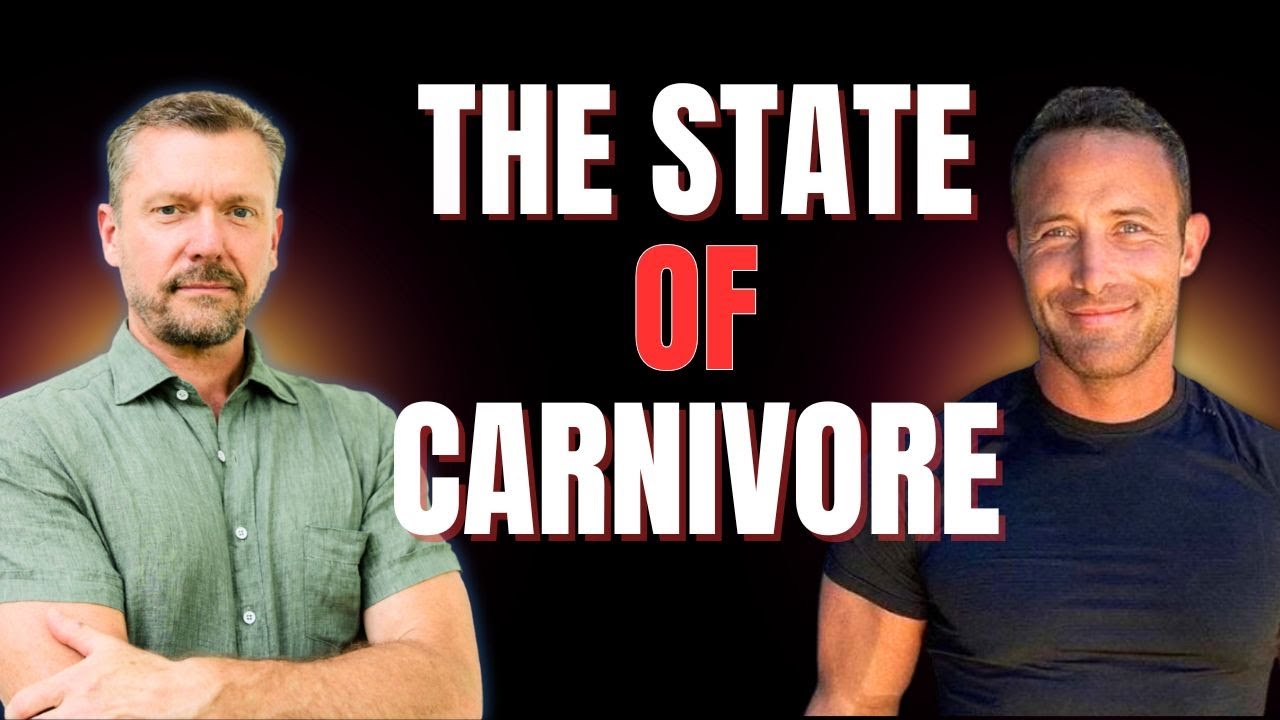- The scientific basis of the carnivore diet and its nutritional components
- Effects of the carnivore diet on metabolic health and insulin sensitivity
- Potential benefits and drawbacks of adopting a carnivore lifestyle
- Cultural and social implications of a carnivore diet
- Future prospects for carnivore diet research
The state of carnivore, as discussed by Dr. Anthony Chaffee, offers key insights into a dietary approach that removes carbohydrates and focuses solely on animal-based foods. This diet emphasizes meat, fish, eggs, and certain animal-based products while excluding all plant-based foods. With the rise in interest around this diet, understanding its scientific foundations and implications is essential.
The carnivore diet fundamentally revolves around clear nutritional principles. It is rich in protein and fats while completely excluding carbohydrates. This change in macronutrient composition can lead to various physiological adaptations. Animal products provide essential amino acids, omega-3 and omega-6 fatty acids, vitamins, and minerals like zinc, iron, and vitamin B12 that are crucial for human health. Studies suggest that the high protein intake can enhance satiety, leading to reduced overall caloric consumption. Furthermore, amino acids are the building blocks of proteins, vital for muscle repair and the production of neurotransmitters.
The absence of carbohydrates in the diet shifts the body’s metabolic pathways. While traditional diets often emphasize glucose as a primary energy source, the carnivore diet encourages the body to enter a state of ketosis, wherein it utilizes fat as its main fuel. During this metabolic change, the liver converts fatty acids into ketones, which serve as an alternative energy source. The adaptation process, known as ketosis, can enhance energy levels, stabilize blood sugar levels, and improve cognitive performance for some individuals.
From a metabolic health perspective, the carnivore diet has attracted attention due to its potential impact on insulin sensitivity. Insulin is a hormone that regulates blood sugar levels. A diet high in carbohydrates can lead to insulin resistance, wherein the body becomes less effective at utilizing insulin. This condition is a precursor to type 2 diabetes. By removing carbs, the carnivore diet may promote greater insulin sensitivity. Emerging research indicates that lower insulin levels may be associated with improved metabolic flexibility, enabling the body to switch more efficiently between burning glucose and fat.
Nevertheless, transitioning to a carnivore diet necessitates careful consideration of its benefits and drawbacks. Proponents often cite weight loss and improvement in specific health markers as positive outcomes. Some individuals report reduced inflammation, better digestive health, and even enhancements in conditions like arthritis or skin issues. These improvements are often linked to the exclusion of plant anti-nutrients and allergens. The elimination of processed foods and sugar can also be beneficial.
Conversely, the diet presents several challenges. Nutritional deficiencies may arise due to a lack of dietary diversity, particularly in micronutrients typically found in fruits and vegetables, such as vitamin C and fiber. Long-term adherence to such a restrictive diet may lead to a lower intake of phytonutrients, which play significant roles in preventing chronic diseases. Moreover, public health guidelines have historically promoted a balanced diet that includes whole grains, fruits, and vegetables for a reason—these foods contribute to a wide range of essential nutrients beyond merely caloric needs.
The carnivore diet also has social and cultural implications. The lifestyle surrounding this diet can be isolating for individuals who partake, particularly in social settings where traditional foods dominate. For many, family gatherings, holidays, or dining out can pose significant challenges. As community plays a vital role in food choices, understanding how the carnivore diet fits into societal norms is essential. Some individuals may face scrutiny or criticism for choosing a diet that opposes widely accepted dietary recommendations.
Research on the carnivore diet is still in its infancy. Evidence supporting its long-term health effects remains limited. In-depth studies assessing the nutritional adequacy, metabolic health, and psychological impacts of long-term adherence are critically needed. As interest grows globally, it will be important to gather more data to assess both positive and negative effects comprehensively. In particular, long-term cohort studies could provide deeper insights into benefits or risks that may surface after years of adhering to such a restricted diet.
Interest in the carnivore diet continues to grow, partly due to anecdotal success stories shared online, and partly due to a broader shift towards low-carbohydrate eating strategies. As individuals seek alternatives to traditional dietary recommendations, the motivation to explore a carnivore lifestyle often stems from personal health experiences.
Ultimately, the state of carnivore poses essential questions about dietary practices and health implications. While it can offer short-term benefits and promote a unique approach to macronutrient distribution, potential drawbacks must be weighed carefully. The confluence of cultural, social, and scientific insights surrounding this diet is critical for those considering the approach. Ongoing research and dialogue will be vital in understanding how this diet can fit into broader discussions about nutrition, health, and wellness.
Emphasizing education on these matters is crucial for dispelling myths and misconceptions. Robust discourse can empower individuals to make informed decisions based on their health needs and preferences. It remains vital to balance enthusiasm for dietary experimentation with caution grounded in scientific understanding.
Overall, the state of carnivore provides a fascinating lens through which individuals can examine their dietary choices while appreciating the complexity of nutritional science in the context of modern health challenges. As new research emerges and evolves, the lessons gleaned will enhance understanding and implementation of diverse dietary practices.
*****
Source Description
Dr Anthony Chaffee is an American trained doctor practicing in Australia. In this video we discuss the carnivore diet, animal based diet, keto diet, diets effect on cortisol, dairy in all forms, fermented foods, chicken & pork vs beef, falsely elevated A1c, gluconeogenesis, vitamin C, creatine supplementation, adding carbs back to a carnivore diet, vegetable seed oils, Vitamin B1 & B12 deficiencies, how to eat eggs properly and much more
Find Dr Chaffee: dranthonychaffee.com
Get access to more LIVE Q&A sessions with Dr. Berry inside the Proper Human Diet Community here : https://drberry.com/community
⭐️FREE downloadable Proper Human Diet GUIDEBOOK: https://www.drberry.com/guidebook
American Diabetes Society: https://www.americandiabetessociety.org/
Sugar Cubee The Sugar Monster And The Super Human Power Foods For Humanity! Proceeds benefit ADS https://amzn.to/42Y3WqK
Low-carb, Keto, Ketovore, & Carnivore consisting of real, whole, nutrient-dense foods are on the Proper Human Diet spectrum. Lose weight, reverse diabetes, eradicate fatty liver, and More
ANCESTRAL SUPPLEMENTS (LIVER, ETC): http://ancestralsupplements.com/drberry (DISCOUNT CODE: drberry)
DAILY MINERALS: https://saltt.com/ref/DrB (discount)
REDMOND REAL SALT: https://glnk.io/oq72y/kendberrymd (code DRBERRY)
LIES MY DOCTOR TOLD ME: https://amzn.to/2XvNNZm
COMMON SENSE LABS book: https://amzn.to/4eD5Emt
PHD Merch: https://www.drberry.com/shop (T-Shirts, Tanks, Hoodies, etc)
Great Keto Recipes: https://cookingketowithfaith.com/
Eat Real MEAT: https://bit.ly/USmeatDiscount (discount = BERRY)
Pluck Organ Seasonings code = DRKEN for 25% off https://eatpluck.com
Support Our Mission: https://bit.ly/DrBerrysCommunity
LMNT electrolytes: drinklmnt.com/Neisha (free gift)
Our Farm Channel: @drberryfarms
Best JERKY I’ve tasted: https://matthatjerky.com/?ref=_vgzta3…
Awesome Coffee roasted in Tennessee: https://hollerroast.com/?ref=keto (discount)
Disclaimer: Nothing in this video is Medical Advice. Dr. Berry does not diagnose, treat, or prevent any medical conditions online; instead, he helps people better understand their health and ways to avoid health problems and promote wellbeing. Make sure you are working with YOUR provider to monitor your health and medications. These posts and videos are not designed to, and do not provide medical advice, professional diagnosis, opinion, treatment, or services to you or to any other individual. As an Amazon Affiliate, I earn from purchases.


